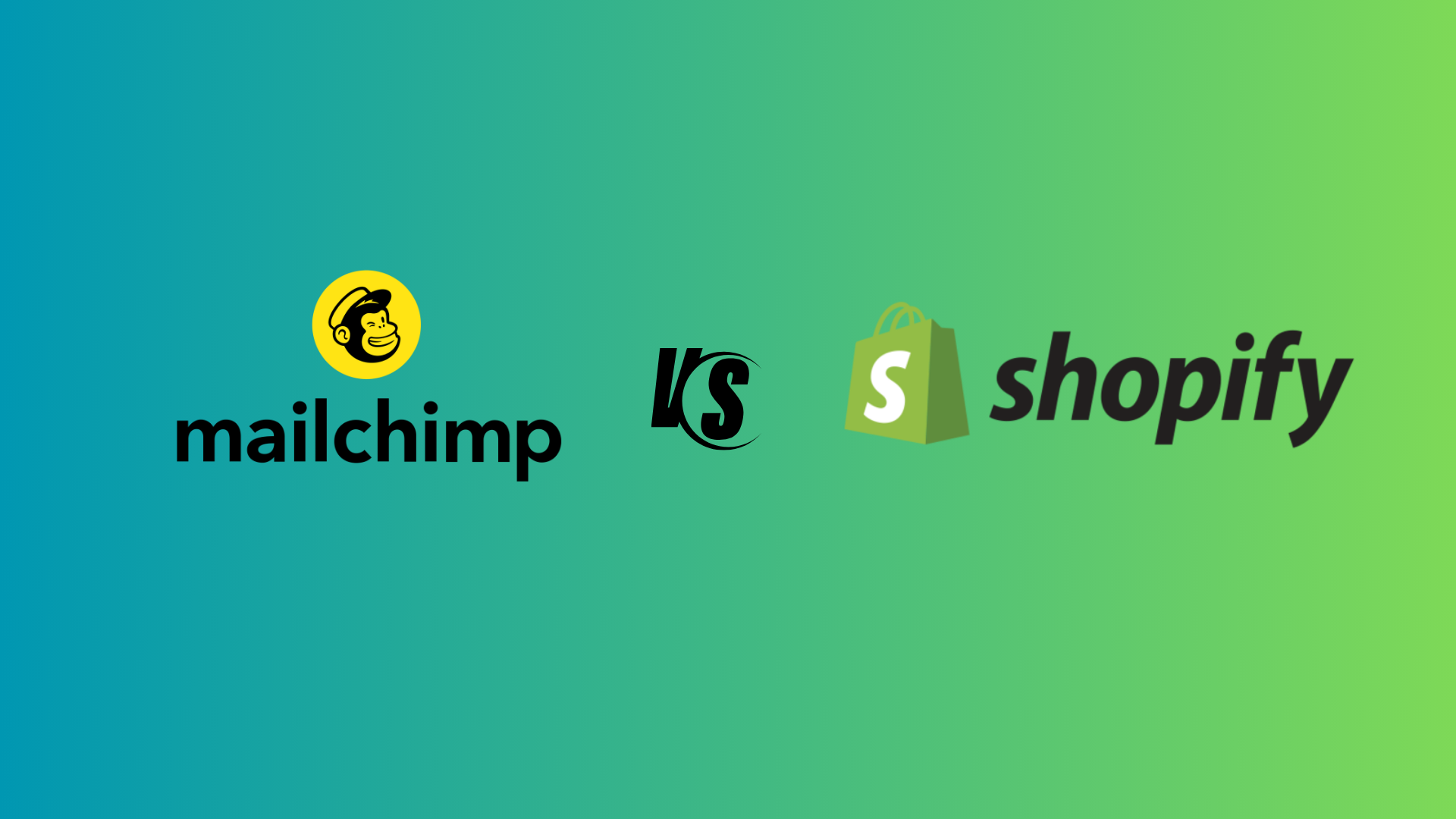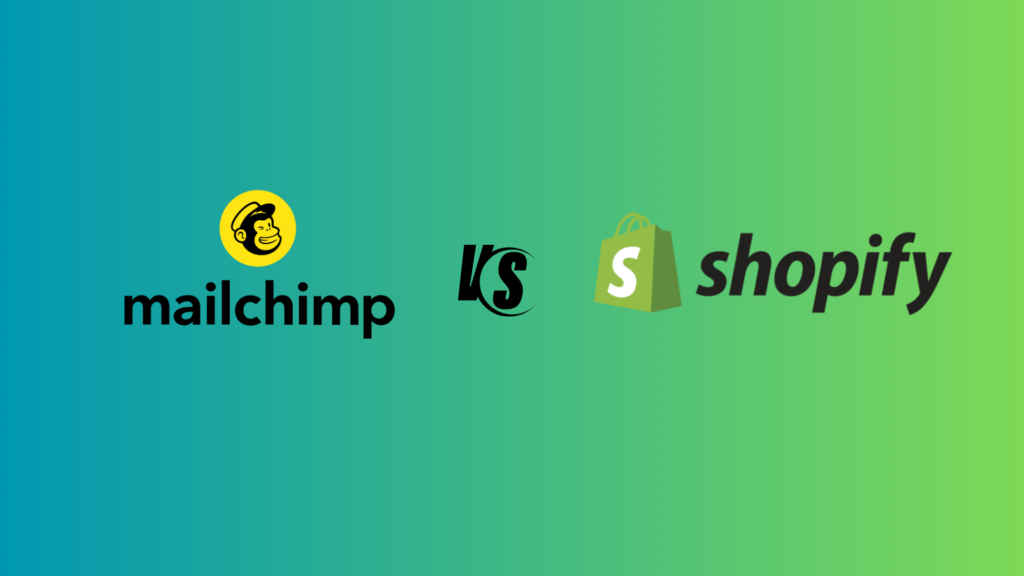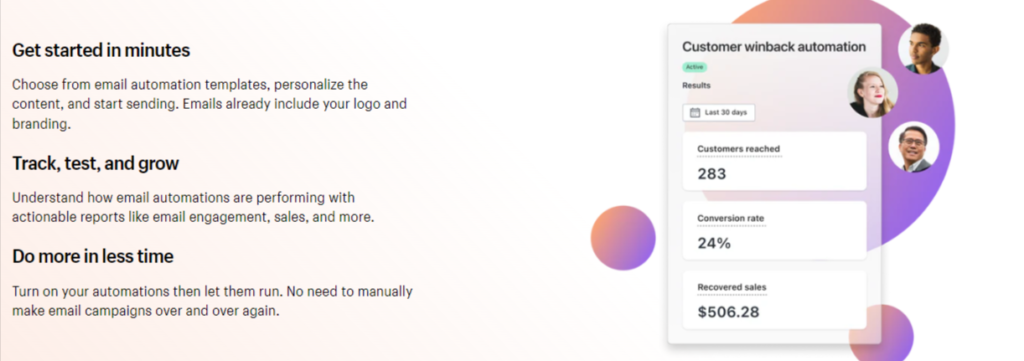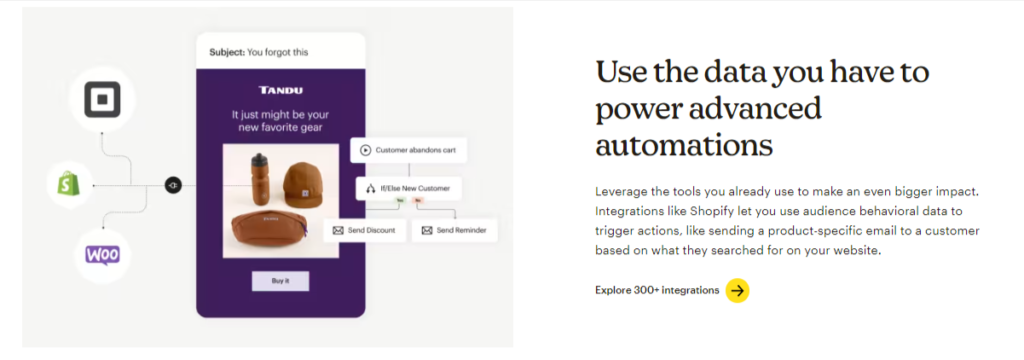Physical Address
304 North Cardinal St.
Dorchester Center, MA 02124
Physical Address
304 North Cardinal St.
Dorchester Center, MA 02124




80% of small and mid-level business owners agree that email marketing is the most important tool for retaining customers. So, if you are a small business owner or even a beginner in the realm of e-commerce, you might be looking for affordable email marketing solutions.
In this case, both Shopify and Mailchimp are the right options. But is it really?
in this detailed article on Shopify Email vs Mailchimp, you’ll find out which platform is right for you in 2024.
There are 4.48 Billion Email users around the world.
With a number that huge, imagine the customer reach you can gain through email marketing alone. According to Forbes, 64% of small business owners use Email marketing.
Email marketing remains one of the easiest and most effective ways to retain and engage with your customers.
Unlike social media Marketing, where you have to depend on the algorithm to do the marketing, you can send direct emails to your customers. Not to mention, email marketing has proven return on investments(ROI).
So, as much as Email marketing is crucial and easier as a marketing channel, it’s also important to determine the right platform for yourself.
Shopify launched its email marketing tool in 2019. Allowing Shopify store owners to seamlessly integrate their email marketing campaigns without having to worry about using third party services.
Shopify is primarily known as an all-in-one ecommerce platform that enables businesses to build and manage their online stores. Beyond its core ecommerce functionalities, They also offer Email marketing—a built-in email marketing solution designed to help merchants reach their customers with targeted campaigns.
Mailchimp, on the other hand, is a service that is dedicated to Email marketing. Unlike Shopify email, Mailchimp supports a wide range of businesses, not just those in ecommerce. Starting in 2001, It has built itself as a high authority in marketing automation and email marketing platform.
It has powerful automation features and a good selection of advanced features that enable brands to create, send, and track email campaigns efficiently.
Both Shopify Email and Mailchimp offer built-in email builders with simple drag-and-drop features.
Shopify’s email builder is directly integrated with their platform, which makes it easier for Shopify ecommerce store owners to build emails. It’s email builder is designed for beginners who want to create quick, basic email campaigns.
Although they have pre-designed templates they are mostly tailored for e-commerce stores. As, their Email marketing platform is directly integrated with Shopify, it’s easier for Shopify store owners to import details of products (images, prices, descriptions) directly from their store.
However, their email builder has basic customization options. it lacks advanced features like Dynamic content, A/B testing or complex design control.
Mailchimp, on the other hand, has a wide variety of tools with a lot of customization options to build your emails from. offers over 100 pre-designed email templates, including newsletters, promotions, product launches, and more. These templates are also highly customizable.
Unlike Shopify Email, Mailchimp provides dynamic content options, enabling personalized emails based on customer behavior or segmentation. It also includes A/B testing, advanced automation, and deeper analytics.
Shopify offers basic email templates that you can customize for free. It also has branded email templates, which allow you to use your brand logo completely for free. Other than the free part, their email templates lack customization options. It offers a limited selection of templates, typically around 10-15 pre-designed options.
Mailchimp, however, offers 100+ email templates across various industries. They are also highly customizable through a drag-and-drop editor, custom HTML, and CSS.
Shopify email offers a set of pre-designed content blocks specifically for your ecommerce store in mind. As it is integrated with your ecommerce store, it automatically adds your product information directly from your store.
Its content blocks are also designed in a way that makes sure your email templates matches your store’s branding. You can also add gift card and discount codes from the content blocks.
Mailchimp on the other hand, offers more thorough customizable options in the content blocks. It also has the option to add product recommendation based on the subscribers data, this can be really helpful for targeted email campaign.
You can target different audience with a single email by enabling dynamic content block. It shows personalized product recommendations based on your customers past purchases.
Shopify offers a third-party app named Shopify Forms App integrated to list emails, create forms, and build landing pages.
IT integrates directly with your Shopify store, making it easier to collect and manage customer email address. You can’t really create highly customizable and engaging Email sign up forms with Shopify Forms App though.
Mailchimp, has a built-in list-building feature. Simply navigate to the top bar and click on “List” to access the List management tools. This allows you to easily create, organize, and segment your email lists.
You can import contacts, set up sign-up forms, and manage subscribers.
However, note that, When calculating your monthly price, Mailchimp will count the same email address on 2 completely separate list as 2 subscribers.
Email Marketing automation is one of the most important tool of marketing campaign in the era of everything automated . It reduces your manual labor and lets you focus on other important tasks such as product creation.


Shopify’s email automation includes basic features, which includes Abandoned cart, Abandoned checkout, Welcome subscribers, and some other basic automation flows.
However, if you want more customized workflows, you have to create them manually with their app called “Shopify Flow.” It’s a separate tool available on higher-tier Shopify plans (like Shopify Plus).
Unlike, Mailchimp though, they don’t have pre-built templates for automation flow.
Mailchimp, in contrast, provides more comprehensive and advanced automation capabilities. It has built-in email automation with 70+ pre-built automation flows. You can also customize the flows, allowing you to create complex workflows directly in the platform without manual setup for triggers or actions.
It allows businesses to create complex, multi-step marketing journeys based on a variety of triggers and conditions


In summary, while Shopify Email automation is designed to complement Shopify’s e-commerce functionalities with straightforward automation solutions, Mailchimp offers a more robust, flexible platform ideal for businesses seeking detailed and varied marketing pathways.
In the realm of analytics and reporting, both Shopify Email and Mailchimp provide tools for tracking and analyzing email campaign performance, although they differ in depth and breadth.
Shopify Email delivers basic analytics that focuses on crucial metrics such as open rates, click-through rates, and conversion tracking—offering a straightforward view tailored to e-commerce businesses looking to understand direct impacts on sales.
Mailchimp, however, goes beyond basic metrics to furnish a comprehensive analytics suite. This includes detailed reports on subscriber behavior, comparative campaign performance, and engagement trends over time.
Its analytics also integrate with other marketing data, allowing for more granular insights into customer journeys and overall marketing strategy efficacy.
one of the standout feature that Mailchimp has is it’s A/B testing tools. You can compare the performance of different types of emails and customers. By doing that, you can analyze the emails that are not performing well, and change them accordingly.
For example: If your goal is to Increase the open rate of a promotional email for a seasonal sale. You can test up to 3 subject lines and see which Subject line led to higher open rate.
With their A/B testing tool, you can test up-to 4 variables: subject line, From name, content, or send time.
Shopify Email on the other hand, does not have built-in A/B testing options. If you want to test different subject lines, email content, or send times, you would need to manually create separate campaigns and compare results, which can be time-consuming and less efficient.
Shopify provides a lot of filtering options when it comes to contact management and segmentation, that allow businesses to categorize their customers effectively. These filters include:
Mailchimp also has various segmentation options. But one advantage their segmentations feature has is that you can add up-to 5 conditions for each segments using “AND” or “OR” operators. Here’s a short list of their segmentation options:
| Feature | Shopify Email | Mailchimp |
|---|---|---|
| Cost | Free up to 10,000 emails per month, after that, $1 per 1,000 additional emails | Free plan available, Essentials plan starts at $11 per month, with additional fees based on the number of subscribers and emails sent |
| Email Limit | 10,000 emails per month on free plan; unlimited emails with paid plans | Varies with plan, Essentials allows up to 500 contacts and up to 10,000 sends per month |
| Additional Features | Integrated with Shopify store | Includes CRM, advanced segmentation, and behavioral targeting features |
| Automation | Basic automation features included | Advanced automation with unlimited triggers |
| Support | 24/7 support exclusive to Shopify store owners | 24/7 support depending on the plan tier |
This table outlines the key differences in pricing between Shopify Email and Mailchimp, allowing businesses to evaluate which platform best suits their email marketing needs.
In case of pricing, Mailchimp has the issue of subscribers appearing on multiple audience lists being double-counted, which leads to higher prices.
In conclusion, Shopify and Mailchimp both offer valuable email marketing solutions, but they cater to distinct needs within the business landscape. Shopify Email is a natural choice for those already operating an e-commerce store on Shopify, as it provides a seamless, integrated experience tailored to that environment.
Mailchimp, with its extensive range of features and ability to support a broader scope of business types, is ideal for those who require advanced email marketing capabilities and are willing to integrate with external platforms.
Ultimately, the choice between Shopify and Mailchimp depends on your business objectives, the complexity of your email marketing needs, and whether you prioritize seamless integration within the Shopify ecosystem or require more advanced marketing functionalities. Consider signing up for a free trial or exploring each platform’s offerings to see which aligns best with your business goals.